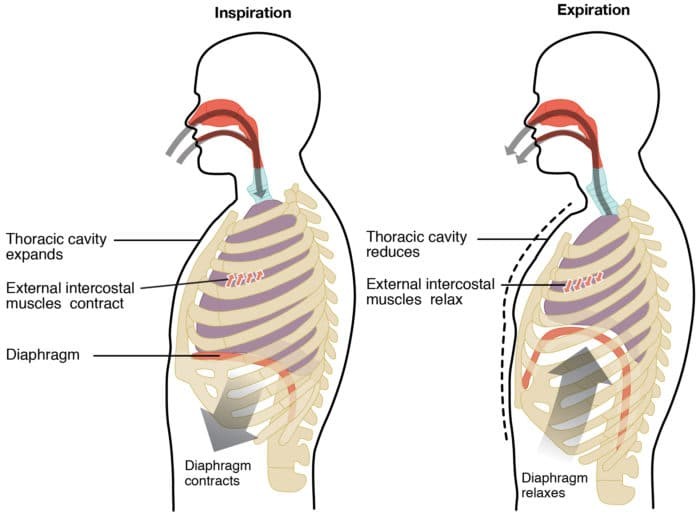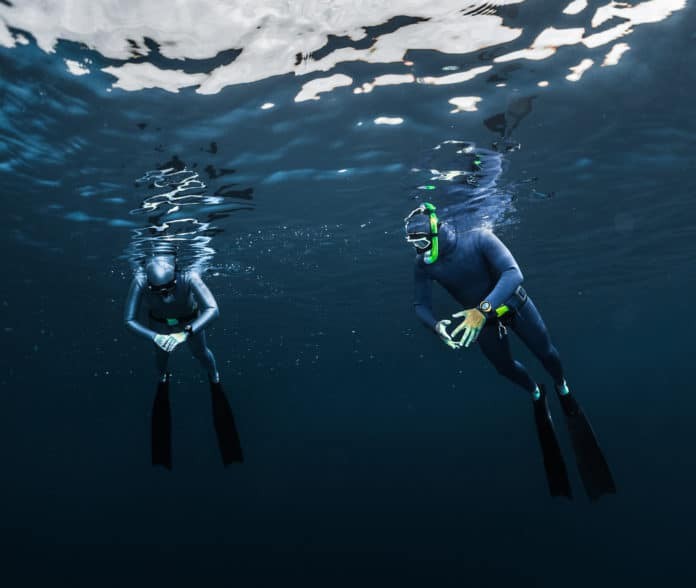A common source of confusion for beginner freedivers relates to breathing during the relaxation phase and taking the final breath before their dive. Relaxation, visualization, and taking a full, final breath is key to getting your heart rate as low as possible and maximizing relaxation. So what techniques can be used in order to get the most out of your breathe up?
Relaxation
An important factor of physical relaxation is avoiding extra movement. Beginners tend to pin their head up to look around, adjust their masks, fidget, and give a few extra kicks to stay in place. All of these little movements do not allow the muscles to relax, and therefore keep your heart rate higher and not at an optimal level. It is best to pretend you are as loose as a single strand of hair, staying absolutely limp and letting the water move your limbs whichever way they please. You should be able to do this in any position you choose to breathe up, whether it is your whole body in the water or just the lower portion.
Knowing the most relaxed position to breathe up in is essential in different conditions. Laying on your back will offer you the most relaxation and allow you to take the fullest breath possible, but what can you do when the water is seriously choppy? You can try breathing face down in the water with a snorkel, which is also very relaxing, as long as water is staying out of your snorkel. Unfortunately, a lot of dead air gets trapped in the snorkel, which means less fresh air and more carbon dioxide in your lungs. If it is too rough for laying on your back or face-down in the water, then breathing up vertically may be your only option. In this case, you can breathe up standing upright in water by using the buoy for support, reach across the buoy to hold onto the edge, or lie across it completely if you are short.
Visualization
An effective way to mentally relax is to visualize your dive before it even happens. You can visualize it going perfectly: think of the feeling of the freefall, the change in buoyancy, and the feeling of success when you reach the bottom. This can remove stress from the impending dive, leave you with a feeling of clarity, and provide mental relaxation.
Visualization can also be an effective way to train ourselves to respond automatically to possible issues during the dive. If you have a problem with relaxation in the middle of a dive, or getting the freefall correct, visualize your entire dive. In the visualization, experience the problem that you are having, but correct it immediately by consciously removing tension in your stomach, or with a simple posture fix to correct your freefall. When you imagine a situation in your head and your response to it, you can train your brain to automatically take action when the problem happens in real life.
The Final Breath

Since our diaphragm, intercostal muscles, and smaller, supporting muscles control how much we fill our lungs, it is a mistake not to use them efficiently. The diaphragm is what pushes our lungs up when we exhale, and drops down when inhale during belly breathing. Therefore, it is important to utilize belly breathing in order to minimize the amount of muscles used while breathing up.
The most efficient way to take the last breath is to:
- Make sure you are breathing within your tidal volume (the breathing pattern you naturally use throughout your day) using your belly. Even, relaxed breaths, without any manipulation – we want to avoid hyperventilation.
- On the last exhale, comfortably exhale as much air as you can, without being forceful and losing relaxation.
- Using your belly first, inhale as much air as you can just in your belly. Make sure the inhale is slow.
- After the belly is filled, keep it relaxed, and continue inhaling slowly using the muscles in your chest to expand it outwards.
- The final breath should be full, but not uncomfortable, and packing should be avoided unless you are an experienced, deep freediver.
Different things work with different people; you may prefer a different routine for your breathe up than what is written here. But if what you are doing currently is not working for you, focusing on relaxation, visualization, and taking your final breath in the manner written above may make a noticeable difference in your dives.

